Stakeholder Relationships & Their Influence on Sainsbury's Practices
VerifiedAdded on 2023/06/14
|6
|1486
|191
Report
AI Summary
This report examines the influence of internal and external stakeholders on Sainsbury's business practices. It defines stakeholders and categorizes them, using Mendelow's Stakeholder Matrix to analyze their power and interest levels. The report discusses the relationships Sainsbury's maintains with its stakeholders, including shareholders, employees, customers, and suppliers, and how these relationships impact business operations. It concludes that effective stakeholder management is crucial for Sainsbury's success, with stakeholders influencing various aspects of the business, from shareholder voting to customer preferences and supplier pricing. The document is available on Desklib, a platform offering a wide range of study tools and solved assignments for students.

Professional discussion
notes
notes
Paraphrase This Document
Need a fresh take? Get an instant paraphrase of this document with our AI Paraphraser
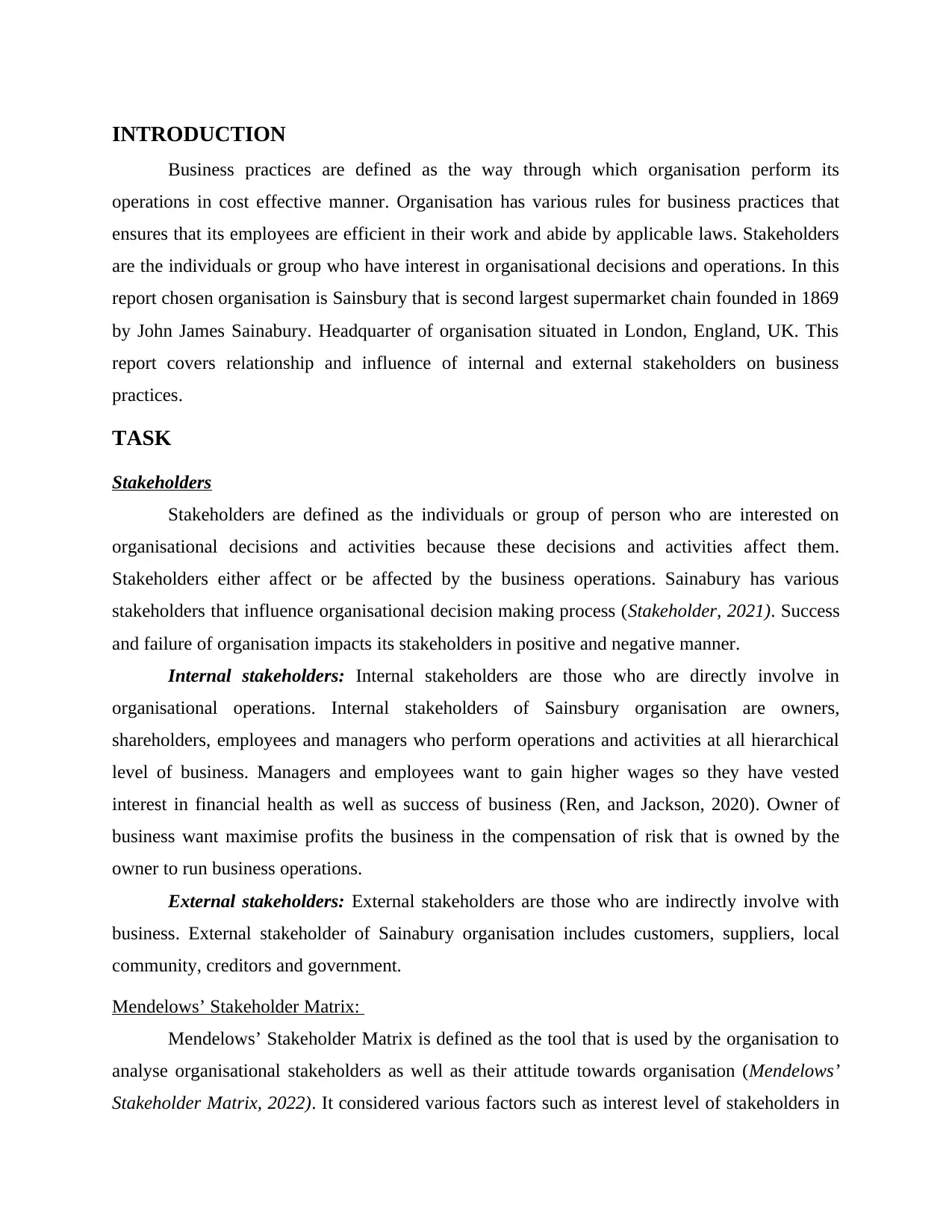
INTRODUCTION
Business practices are defined as the way through which organisation perform its
operations in cost effective manner. Organisation has various rules for business practices that
ensures that its employees are efficient in their work and abide by applicable laws. Stakeholders
are the individuals or group who have interest in organisational decisions and operations. In this
report chosen organisation is Sainsbury that is second largest supermarket chain founded in 1869
by John James Sainabury. Headquarter of organisation situated in London, England, UK. This
report covers relationship and influence of internal and external stakeholders on business
practices.
TASK
Stakeholders
Stakeholders are defined as the individuals or group of person who are interested on
organisational decisions and activities because these decisions and activities affect them.
Stakeholders either affect or be affected by the business operations. Sainabury has various
stakeholders that influence organisational decision making process (Stakeholder, 2021). Success
and failure of organisation impacts its stakeholders in positive and negative manner.
Internal stakeholders: Internal stakeholders are those who are directly involve in
organisational operations. Internal stakeholders of Sainsbury organisation are owners,
shareholders, employees and managers who perform operations and activities at all hierarchical
level of business. Managers and employees want to gain higher wages so they have vested
interest in financial health as well as success of business (Ren, and Jackson, 2020). Owner of
business want maximise profits the business in the compensation of risk that is owned by the
owner to run business operations.
External stakeholders: External stakeholders are those who are indirectly involve with
business. External stakeholder of Sainabury organisation includes customers, suppliers, local
community, creditors and government.
Mendelows’ Stakeholder Matrix:
Mendelows’ Stakeholder Matrix is defined as the tool that is used by the organisation to
analyse organisational stakeholders as well as their attitude towards organisation (Mendelows’
Stakeholder Matrix, 2022). It considered various factors such as interest level of stakeholders in
Business practices are defined as the way through which organisation perform its
operations in cost effective manner. Organisation has various rules for business practices that
ensures that its employees are efficient in their work and abide by applicable laws. Stakeholders
are the individuals or group who have interest in organisational decisions and operations. In this
report chosen organisation is Sainsbury that is second largest supermarket chain founded in 1869
by John James Sainabury. Headquarter of organisation situated in London, England, UK. This
report covers relationship and influence of internal and external stakeholders on business
practices.
TASK
Stakeholders
Stakeholders are defined as the individuals or group of person who are interested on
organisational decisions and activities because these decisions and activities affect them.
Stakeholders either affect or be affected by the business operations. Sainabury has various
stakeholders that influence organisational decision making process (Stakeholder, 2021). Success
and failure of organisation impacts its stakeholders in positive and negative manner.
Internal stakeholders: Internal stakeholders are those who are directly involve in
organisational operations. Internal stakeholders of Sainsbury organisation are owners,
shareholders, employees and managers who perform operations and activities at all hierarchical
level of business. Managers and employees want to gain higher wages so they have vested
interest in financial health as well as success of business (Ren, and Jackson, 2020). Owner of
business want maximise profits the business in the compensation of risk that is owned by the
owner to run business operations.
External stakeholders: External stakeholders are those who are indirectly involve with
business. External stakeholder of Sainabury organisation includes customers, suppliers, local
community, creditors and government.
Mendelows’ Stakeholder Matrix:
Mendelows’ Stakeholder Matrix is defined as the tool that is used by the organisation to
analyse organisational stakeholders as well as their attitude towards organisation (Mendelows’
Stakeholder Matrix, 2022). It considered various factors such as interest level of stakeholders in
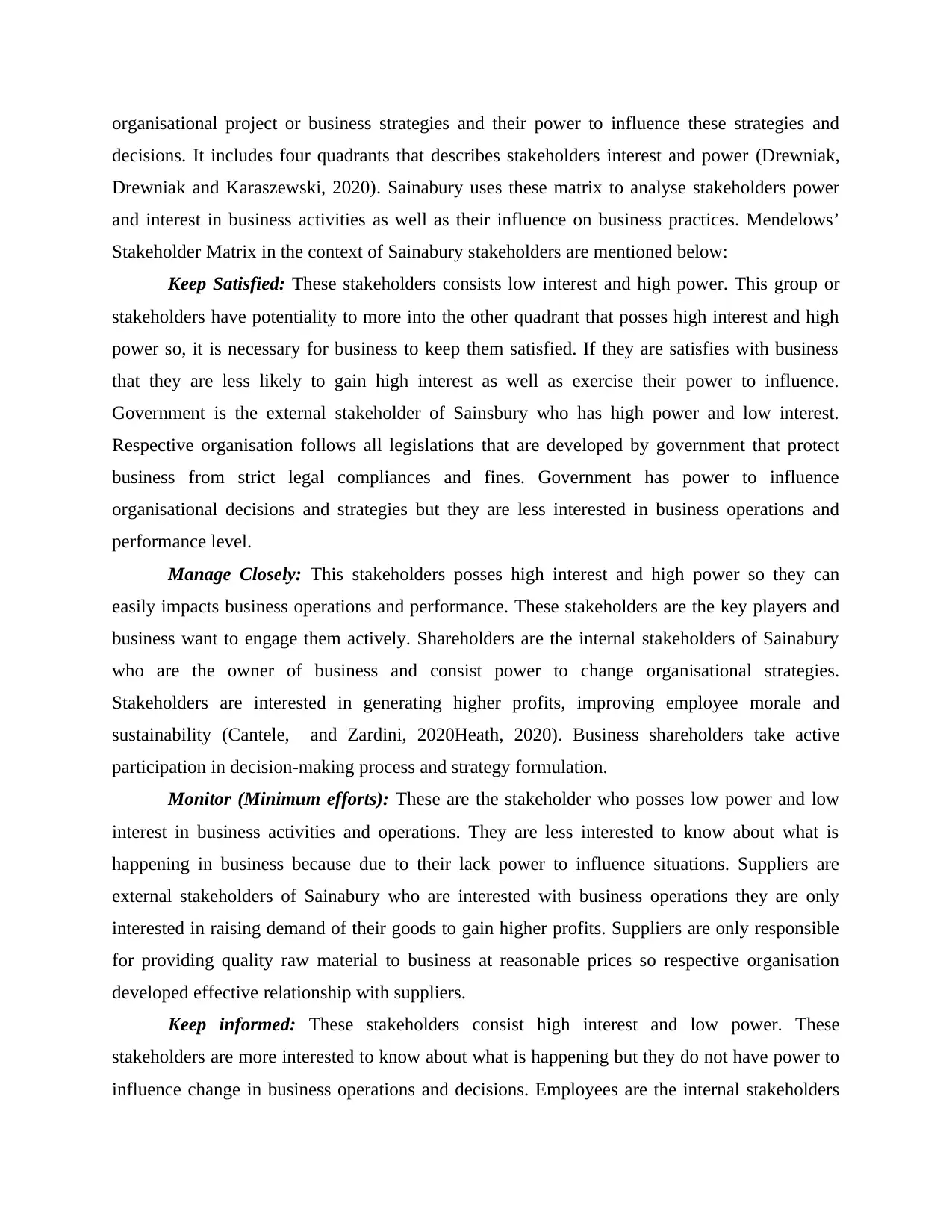
organisational project or business strategies and their power to influence these strategies and
decisions. It includes four quadrants that describes stakeholders interest and power (Drewniak,
Drewniak and Karaszewski, 2020). Sainabury uses these matrix to analyse stakeholders power
and interest in business activities as well as their influence on business practices. Mendelows’
Stakeholder Matrix in the context of Sainabury stakeholders are mentioned below:
Keep Satisfied: These stakeholders consists low interest and high power. This group or
stakeholders have potentiality to more into the other quadrant that posses high interest and high
power so, it is necessary for business to keep them satisfied. If they are satisfies with business
that they are less likely to gain high interest as well as exercise their power to influence.
Government is the external stakeholder of Sainsbury who has high power and low interest.
Respective organisation follows all legislations that are developed by government that protect
business from strict legal compliances and fines. Government has power to influence
organisational decisions and strategies but they are less interested in business operations and
performance level.
Manage Closely: This stakeholders posses high interest and high power so they can
easily impacts business operations and performance. These stakeholders are the key players and
business want to engage them actively. Shareholders are the internal stakeholders of Sainabury
who are the owner of business and consist power to change organisational strategies.
Stakeholders are interested in generating higher profits, improving employee morale and
sustainability (Cantele, and Zardini, 2020Heath, 2020). Business shareholders take active
participation in decision-making process and strategy formulation.
Monitor (Minimum efforts): These are the stakeholder who posses low power and low
interest in business activities and operations. They are less interested to know about what is
happening in business because due to their lack power to influence situations. Suppliers are
external stakeholders of Sainabury who are interested with business operations they are only
interested in raising demand of their goods to gain higher profits. Suppliers are only responsible
for providing quality raw material to business at reasonable prices so respective organisation
developed effective relationship with suppliers.
Keep informed: These stakeholders consist high interest and low power. These
stakeholders are more interested to know about what is happening but they do not have power to
influence change in business operations and decisions. Employees are the internal stakeholders
decisions. It includes four quadrants that describes stakeholders interest and power (Drewniak,
Drewniak and Karaszewski, 2020). Sainabury uses these matrix to analyse stakeholders power
and interest in business activities as well as their influence on business practices. Mendelows’
Stakeholder Matrix in the context of Sainabury stakeholders are mentioned below:
Keep Satisfied: These stakeholders consists low interest and high power. This group or
stakeholders have potentiality to more into the other quadrant that posses high interest and high
power so, it is necessary for business to keep them satisfied. If they are satisfies with business
that they are less likely to gain high interest as well as exercise their power to influence.
Government is the external stakeholder of Sainsbury who has high power and low interest.
Respective organisation follows all legislations that are developed by government that protect
business from strict legal compliances and fines. Government has power to influence
organisational decisions and strategies but they are less interested in business operations and
performance level.
Manage Closely: This stakeholders posses high interest and high power so they can
easily impacts business operations and performance. These stakeholders are the key players and
business want to engage them actively. Shareholders are the internal stakeholders of Sainabury
who are the owner of business and consist power to change organisational strategies.
Stakeholders are interested in generating higher profits, improving employee morale and
sustainability (Cantele, and Zardini, 2020Heath, 2020). Business shareholders take active
participation in decision-making process and strategy formulation.
Monitor (Minimum efforts): These are the stakeholder who posses low power and low
interest in business activities and operations. They are less interested to know about what is
happening in business because due to their lack power to influence situations. Suppliers are
external stakeholders of Sainabury who are interested with business operations they are only
interested in raising demand of their goods to gain higher profits. Suppliers are only responsible
for providing quality raw material to business at reasonable prices so respective organisation
developed effective relationship with suppliers.
Keep informed: These stakeholders consist high interest and low power. These
stakeholders are more interested to know about what is happening but they do not have power to
influence change in business operations and decisions. Employees are the internal stakeholders
⊘ This is a preview!⊘
Do you want full access?
Subscribe today to unlock all pages.

Trusted by 1+ million students worldwide
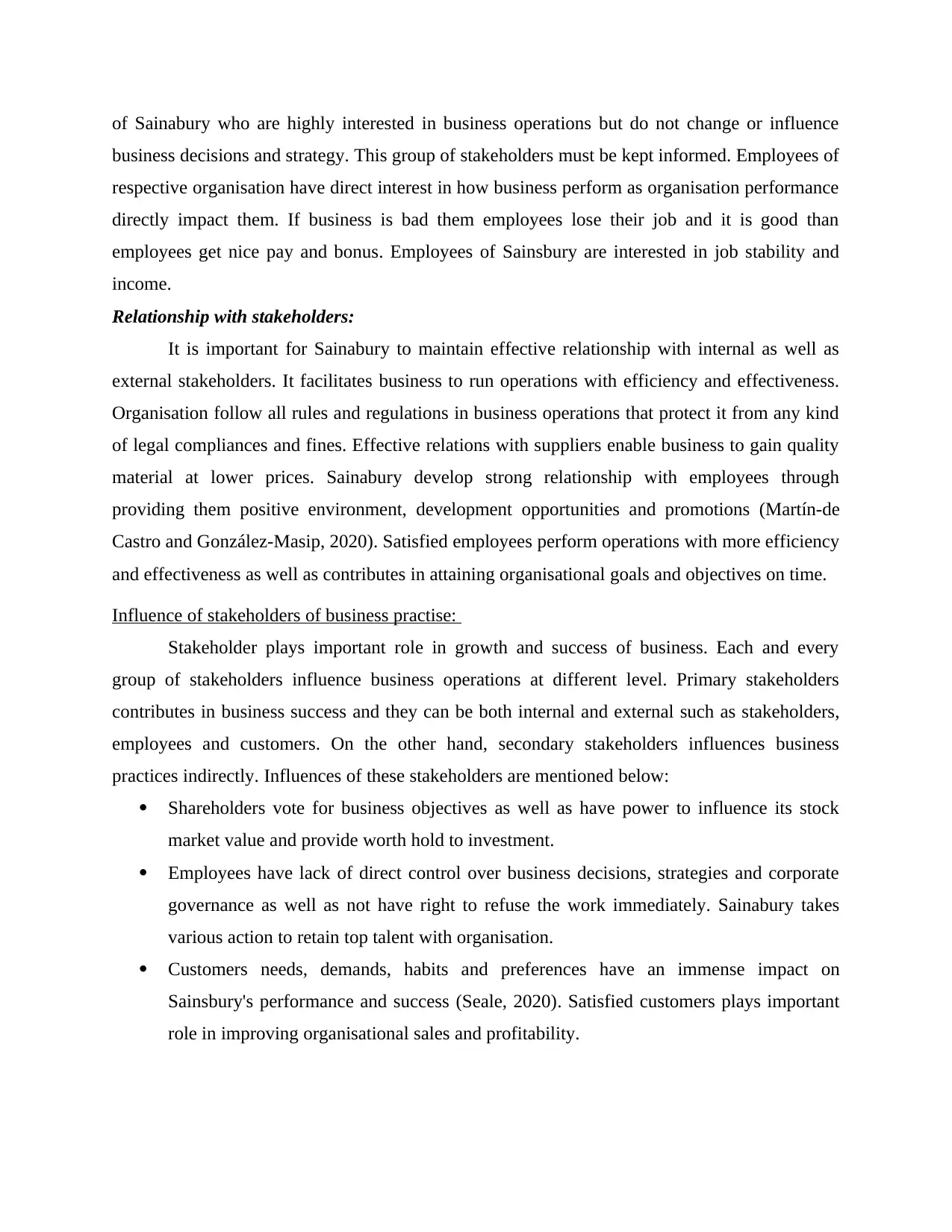
of Sainabury who are highly interested in business operations but do not change or influence
business decisions and strategy. This group of stakeholders must be kept informed. Employees of
respective organisation have direct interest in how business perform as organisation performance
directly impact them. If business is bad them employees lose their job and it is good than
employees get nice pay and bonus. Employees of Sainsbury are interested in job stability and
income.
Relationship with stakeholders:
It is important for Sainabury to maintain effective relationship with internal as well as
external stakeholders. It facilitates business to run operations with efficiency and effectiveness.
Organisation follow all rules and regulations in business operations that protect it from any kind
of legal compliances and fines. Effective relations with suppliers enable business to gain quality
material at lower prices. Sainabury develop strong relationship with employees through
providing them positive environment, development opportunities and promotions (Martín-de
Castro and González-Masip, 2020). Satisfied employees perform operations with more efficiency
and effectiveness as well as contributes in attaining organisational goals and objectives on time.
Influence of stakeholders of business practise:
Stakeholder plays important role in growth and success of business. Each and every
group of stakeholders influence business operations at different level. Primary stakeholders
contributes in business success and they can be both internal and external such as stakeholders,
employees and customers. On the other hand, secondary stakeholders influences business
practices indirectly. Influences of these stakeholders are mentioned below:
Shareholders vote for business objectives as well as have power to influence its stock
market value and provide worth hold to investment.
Employees have lack of direct control over business decisions, strategies and corporate
governance as well as not have right to refuse the work immediately. Sainabury takes
various action to retain top talent with organisation.
Customers needs, demands, habits and preferences have an immense impact on
Sainsbury's performance and success (Seale, 2020). Satisfied customers plays important
role in improving organisational sales and profitability.
business decisions and strategy. This group of stakeholders must be kept informed. Employees of
respective organisation have direct interest in how business perform as organisation performance
directly impact them. If business is bad them employees lose their job and it is good than
employees get nice pay and bonus. Employees of Sainsbury are interested in job stability and
income.
Relationship with stakeholders:
It is important for Sainabury to maintain effective relationship with internal as well as
external stakeholders. It facilitates business to run operations with efficiency and effectiveness.
Organisation follow all rules and regulations in business operations that protect it from any kind
of legal compliances and fines. Effective relations with suppliers enable business to gain quality
material at lower prices. Sainabury develop strong relationship with employees through
providing them positive environment, development opportunities and promotions (Martín-de
Castro and González-Masip, 2020). Satisfied employees perform operations with more efficiency
and effectiveness as well as contributes in attaining organisational goals and objectives on time.
Influence of stakeholders of business practise:
Stakeholder plays important role in growth and success of business. Each and every
group of stakeholders influence business operations at different level. Primary stakeholders
contributes in business success and they can be both internal and external such as stakeholders,
employees and customers. On the other hand, secondary stakeholders influences business
practices indirectly. Influences of these stakeholders are mentioned below:
Shareholders vote for business objectives as well as have power to influence its stock
market value and provide worth hold to investment.
Employees have lack of direct control over business decisions, strategies and corporate
governance as well as not have right to refuse the work immediately. Sainabury takes
various action to retain top talent with organisation.
Customers needs, demands, habits and preferences have an immense impact on
Sainsbury's performance and success (Seale, 2020). Satisfied customers plays important
role in improving organisational sales and profitability.
Paraphrase This Document
Need a fresh take? Get an instant paraphrase of this document with our AI Paraphraser
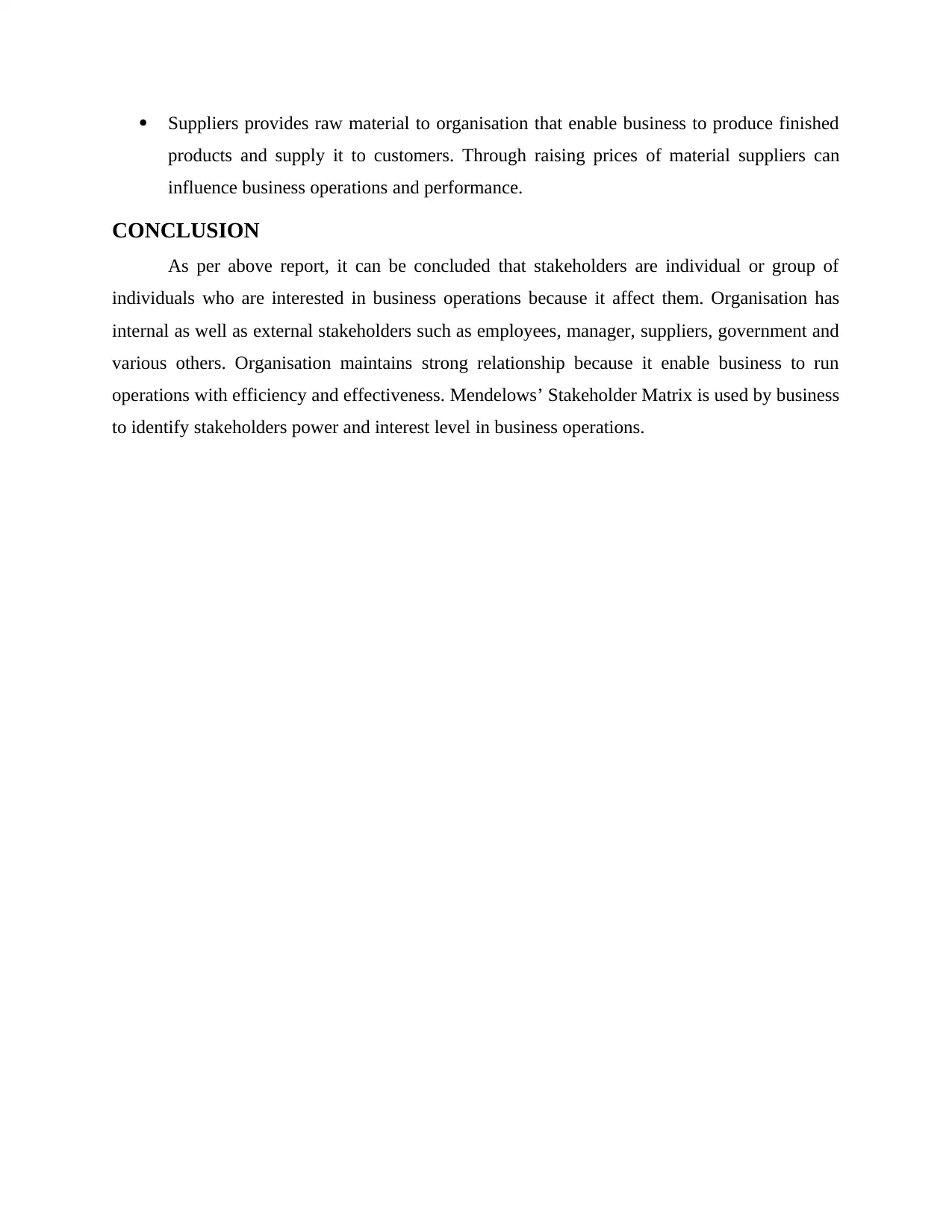
Suppliers provides raw material to organisation that enable business to produce finished
products and supply it to customers. Through raising prices of material suppliers can
influence business operations and performance.
CONCLUSION
As per above report, it can be concluded that stakeholders are individual or group of
individuals who are interested in business operations because it affect them. Organisation has
internal as well as external stakeholders such as employees, manager, suppliers, government and
various others. Organisation maintains strong relationship because it enable business to run
operations with efficiency and effectiveness. Mendelows’ Stakeholder Matrix is used by business
to identify stakeholders power and interest level in business operations.
products and supply it to customers. Through raising prices of material suppliers can
influence business operations and performance.
CONCLUSION
As per above report, it can be concluded that stakeholders are individual or group of
individuals who are interested in business operations because it affect them. Organisation has
internal as well as external stakeholders such as employees, manager, suppliers, government and
various others. Organisation maintains strong relationship because it enable business to run
operations with efficiency and effectiveness. Mendelows’ Stakeholder Matrix is used by business
to identify stakeholders power and interest level in business operations.
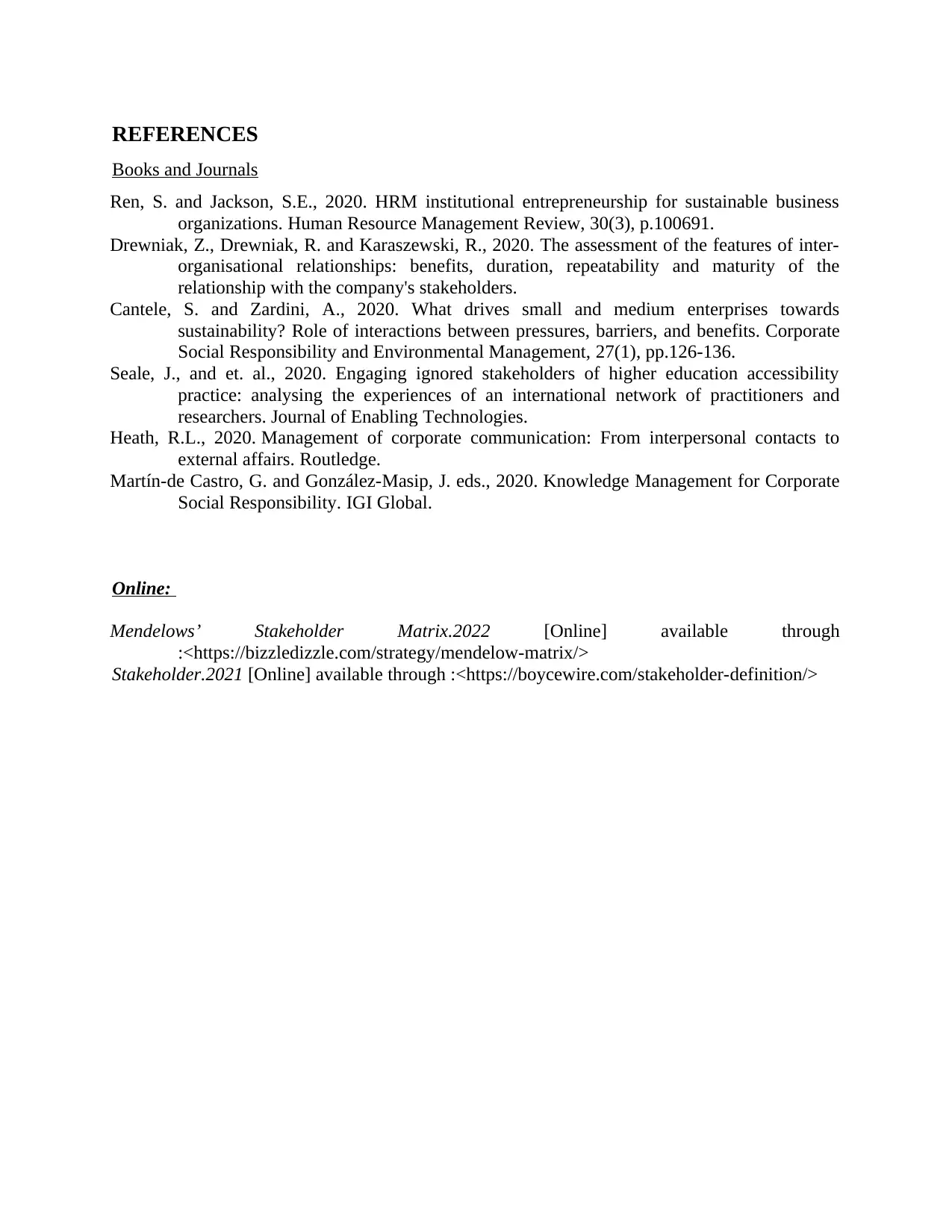
REFERENCES
Books and Journals
Ren, S. and Jackson, S.E., 2020. HRM institutional entrepreneurship for sustainable business
organizations. Human Resource Management Review, 30(3), p.100691.
Drewniak, Z., Drewniak, R. and Karaszewski, R., 2020. The assessment of the features of inter-
organisational relationships: benefits, duration, repeatability and maturity of the
relationship with the company's stakeholders.
Cantele, S. and Zardini, A., 2020. What drives small and medium enterprises towards
sustainability? Role of interactions between pressures, barriers, and benefits. Corporate
Social Responsibility and Environmental Management, 27(1), pp.126-136.
Seale, J., and et. al., 2020. Engaging ignored stakeholders of higher education accessibility
practice: analysing the experiences of an international network of practitioners and
researchers. Journal of Enabling Technologies.
Heath, R.L., 2020. Management of corporate communication: From interpersonal contacts to
external affairs. Routledge.
Martín-de Castro, G. and González-Masip, J. eds., 2020. Knowledge Management for Corporate
Social Responsibility. IGI Global.
Online:
Mendelows’ Stakeholder Matrix.2022 [Online] available through
:<https://bizzledizzle.com/strategy/mendelow-matrix/>
Stakeholder.2021 [Online] available through :<https://boycewire.com/stakeholder-definition/>
Books and Journals
Ren, S. and Jackson, S.E., 2020. HRM institutional entrepreneurship for sustainable business
organizations. Human Resource Management Review, 30(3), p.100691.
Drewniak, Z., Drewniak, R. and Karaszewski, R., 2020. The assessment of the features of inter-
organisational relationships: benefits, duration, repeatability and maturity of the
relationship with the company's stakeholders.
Cantele, S. and Zardini, A., 2020. What drives small and medium enterprises towards
sustainability? Role of interactions between pressures, barriers, and benefits. Corporate
Social Responsibility and Environmental Management, 27(1), pp.126-136.
Seale, J., and et. al., 2020. Engaging ignored stakeholders of higher education accessibility
practice: analysing the experiences of an international network of practitioners and
researchers. Journal of Enabling Technologies.
Heath, R.L., 2020. Management of corporate communication: From interpersonal contacts to
external affairs. Routledge.
Martín-de Castro, G. and González-Masip, J. eds., 2020. Knowledge Management for Corporate
Social Responsibility. IGI Global.
Online:
Mendelows’ Stakeholder Matrix.2022 [Online] available through
:<https://bizzledizzle.com/strategy/mendelow-matrix/>
Stakeholder.2021 [Online] available through :<https://boycewire.com/stakeholder-definition/>
⊘ This is a preview!⊘
Do you want full access?
Subscribe today to unlock all pages.

Trusted by 1+ million students worldwide
1 out of 6
Related Documents
Your All-in-One AI-Powered Toolkit for Academic Success.
+13062052269
info@desklib.com
Available 24*7 on WhatsApp / Email
![[object Object]](/_next/static/media/star-bottom.7253800d.svg)
Unlock your academic potential
Copyright © 2020–2026 A2Z Services. All Rights Reserved. Developed and managed by ZUCOL.





